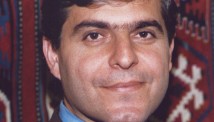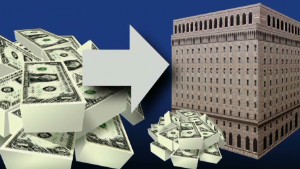This article is taken from Reuters.com
вторник, 20 август 2013 г.
NYSE Amex Options reviewing large number of erroneous trades
Finnish adjusted jobless rate 7.7 percent in July
This article is taken from Reuters.com
FINNEWS LATAM-Latin America corporate defaults hit four-year high, Moody's says
This article is taken from Reuters.com
European shares hit three week low as volatility spikes
This article is taken from Reuters.com
BHP delays $14 billion Canada potash push as profit drops
This article is taken from Reuters.com
China oil imports to overtake U.S. by 2017: WoodMac
This article is taken from Reuters.com
Deutsche Wohnen makes $2.3 billion bet on Berlin property with GSW bid
This article is taken from Reuters.com
Tesla says Model S won rare 5-star safety ratings across board
This article is taken from Reuters.com
Glencore seeks fresh start with $7.7 billion hit to Xstrata
This article is taken from Reuters.com
UPDATE 3-Penney sales tumble but back-to-school "encouraging" so far
This article is taken from Reuters.com
Ally to raise capital, buy back stock from U.S.
This article is taken from Reuters.com
Penney sales tumble but back-to-school 'encouraging' so far
This article is taken from Reuters.com
Cautious consumers, wet weather cloud Dick's Sporting outlook
This article is taken from Reuters.com
Florence tomb opened in search for identity of Mona Lisa
This article is taken from Reuters.com
ECB's Asmussen to check up on Greek reform progress
This article is taken from Reuters.com
China oil imports to overtake U.S. by 2017: WoodMac
This article is taken from Reuters.com
BAE Systems' U.S. CEO to retire in 2014
This article is taken from Reuters.com
Penney sales tumble but back-to-school 'encouraging' so far
This article is taken from Reuters.com
Boston police head a candidate for Homeland chief
New York (CNN) -- Boston Police Commissioner Ed Davis is on the short list of the Obama's administration candidates for the position of Homeland Security secretary, a Boston government official told CNN.
Davis "is very interested" in the position, the source said.
Commissioner since 2006, Davis recently received accolades for his handling of the Boston Marathon bombing and ensuing manhunt.
Former Boston Police Chief William Bratton is also on the short list, the source said.
The current secretary, Janet Napolitano, announced her resignation last month and said she'll be leaving the office in September to become president of the University of California system.
This article is taken from CNN.com
Cautious consumers, wet weather cloud Dick's Sporting outlook
This article is taken from Reuters.com
Bradley Manning play scoops British drama award
This article is taken from Reuters.com
Bugs, Spam and, er, testicles: These are the world's weirdest food festivals
(CNN) -- Humans have a strange relationship with food. This seems to be a global truth that is perhaps best evidenced by the array of unusual food festivals the world over. We don't merely celebrate food, we wrestle in it, wage war with it, idolize it, and, in Gloucestershire, England, race it down a steep hill.
No matter what your favorite food is, chances are somewhere, large gatherings of aficionados have found some outlandish way to commemorate it. Even Spam has found a place of honor.
"Hawaii is one of the biggest consumers of Spam in the world," explains Karen Winpenny, an organizer of the annual Waikiki Spam Jam, which last year had 25,000 visitors. Hormel Foods sells more product in Hawaii per person than in any other U.S. state. According to the Spam Jam website, almost seven million cans of the stuff are eaten in Hawaii every year.
The festival's dozen or so vendors demonstrate the meat-product's unexpected versatility.
"This year, we had Spam cheesecake and Spam ice cream. In the past, we've had Spam ravioli, Spam kotsu, Spam poki, Spam French fries -- pretty much everything can be made with Spam," says Winpenny.
Foods represented at festivals can range from the more mundane -- melons, pumpkins, potatoes -- to the downright daring. In West Virginia, locals are keen to celebrate a local delicacy -- road kill. Last week saw the kick off of Clinton, MT's Testy Festy, a celebration of Rocky Mountain Oysters, aka bull testicles. Next month, adventurous eaters can sample scorpions at Bugfest in North Carolina.
Karen Winpenny, Waikiki Spam Jam
However, there are times when imbibing our favorite foods is not enough. Sometimes, it seems, making a mess is the only way to do it justice. Several festivals demand participants get dirty. La Tomatina -- where thousands travel to Spain to engage in a bustling tomato fight -- is perhaps the most famous of these, though there are many instances in which festival-goers feel the need to rollick around in grub.
On August 23, Barnesville, Minnesota, will celebrate Potato Days, an annual two-day festival dedicated to the humble tuber. No matter how many activities the organizers introduce, however, the most popular remains the mashed potato wrestling competition.
"It's quite a sight to watch people wrestling around in mashed potatoes," admits Theresa Olson, the festival's executive director. "Afterward, they find mashed potato everywhere."
The festival started in 1951 as a source of post-harvest entertainment. Back then, the activities were limited to a potato picking contest for the men, and a peeling competition for the women. Since then, it's matured, and events include a cook-off, a mashed potato sculpting contest and a potato sack fashion show.
Read more: The world's messiest festivals
"It's often voted one of the best festivals in America, partly because it's family friendly, and it's free," says Olson.
In some instances, culinary celebrations act as a historic link. In Bessieres, France, the townspeople make a giant omelet every Easter to feed the poor, a tradition that supposedly started when Napoleon and his army stopped in the town for the night. Legend has it that The Little Corporal ordered the villagers to gather all their eggs to make an omelet for his army.
The celebration has since spread to French-speaking communities across the globe. In Abbeville, Louisiana, the town launched their own version of the tradition (albeit with a Creole twist).
Theresa Olson, Potato Days
"It's grown to seven cities throughout the world, and we each add a local ingredient," says Arlene White, the third Grand Maitre of Abbeville's Giant Omelette Celebration. The town uses 5,000 eggs, and adds Tabasco and crayfish to make it their own.
While there are many who would argue that food is art, some regions take this line of thinking to a new level. At the Räbechilbi Turnip Festival in Switzerland, for instance, locals create elaborate floats using 40 tons of hallowed out turnips. In the past, they've created replicas of panthers, windmills, ships, whales -- even Amy Winehouse. Though the tiny town of Richterswil houses a meager 12,000 residents, the festival attracts 20,000 visitors each year.
"We're a small village, so you can imagine how crowded it gets," says Michèle Fasler, a spokeswoman for Räbechilbi.
Fasler describes the atmosphere as warm and peaceful. Just don't eat the turnips, she warns.
"It's not good for your stomach," she says. "It's like eating too much beans."
This article is taken from CNN.com
5 questions for 'Night Film' author Marisha Pessl
(CNN) -- Who is Stanislas Cordova? That's the burning question at the heart of "Night Film," the anticipated follow-up to best-selling author Marisha Pessl's 2006 literary debut.
Pessl burst onto the scene in 2006 with "Special Topics in Calamity Physics." She received a six-figure advance, almost unheard of for a first-time author, a ton of hype and even some snarky backlash over her photogenic looks. But the book lived up to expectations, selling some 200,000 copies and landing on The New York Times' list of Best Books of 2006.
Seven years later, "Night Film" is hitting bookstores this week amid greater expectations and even more hype. Movie rights are already spoken for by Chernin Entertainment, the studio behind "Oblivion" and "Dawn of the Planet of the Apes," and critics are raving about Pessl's multimedia storytelling approach, which takes readers beyond the novel's pages to explore the story of a mysterious director and the washed-up reporter out to expose him.
Pessl's fictional mash-up of Stanley Kubrick, Roman Polanski and David Lynch hasn't been seen in public for 30 years. His movies are so frightening no theater will show them; his cult of fans meet in abandoned buildings and underground tunnels for secret screenings.
Investigative journalist Scott McGrath tried to expose Cordova years ago and it backfired, costing him his job, marriage and reputation. When Cordova's daughter turns up dead in an apparent suicide, McGrath sees an opportunity to exact revenge against the man he blames for his downfall.
Pessl weaves into the narrative excerpts from magazine articles, newspaper headlines, police reports, crime scene photos and screen shots of online message boards. She also wrote and directed several short films being featured over the next few weeks on YouTube that offer clues into the book's mystery, including snippets and trailers from Cordova's films.
Pessl said she wanted to give readers another way to interact with the story, hoping her fans obsess over "Night Film" just as she did writing it.
Fast facts: Marisha Pessl
Age: 35
Hometown: Grew up in Asheville, North Carolina; lives in New York City.
For fans of: Psychological thrillers like Gillian Flynn's critically acclaimed "Gone Girl," and "The Secret History" by Donna Tartt.
Five questions with Marisha Pessl
CNN: What was the spark behind this book?
Pessl: It was definitely Cordova and the idea of this underground, hidden figure. I'd done a lot of research on filmmakers and the idea of an auteur and patriarch who invites people to his estate to make a film, like Kubrick shot his films on a set that had been built on his estate so he didn't have to leave. That was a germinating idea for me in terms of Cordova.
Also, the idea of someone hidden, our world is so overexposed right now. People don't get out of bed without tweeting about it. People don't make art these days without begging people to interact with it, to buy it, to consume it in some way. I wanted to create the antithesis of all that, a figure who went out of his way to become completely underground, who didn't care about selling any kind of product. It was really about a return to mystery in our lives and finding that again in our overexposed world.
CNN: The book has a compulsive, driven feel to it. Was it that way for you writing it?
Pessl: The writing process was exactly as obsessive. In some ways the writer's experience with the material can't help but drip down onto the pages. I wouldn't call it anxiety because I really did love creating this world, but there were things that kept me awake at night. I think that sense of dislocation and claustrophobia and not exactly knowing where I was going, only that I was driven to find out what was there at the very end. I had all those same experiences as a writer that my characters did, simply because of the nature of this book. I wanted to push myself to the end of my writing experience and then see if I could take myself even further. I really wanted to challenge myself.
CNN: Tell me why you used a multimedia approach to the story?
Pessl: I wasn't trying to break any boundaries but I wanted to find the best means by which to tell the story. I personally love archives and I love going through old antique stores and looking at old wedding photographs, and old class photos of people in kindergarten in the 1920s. I love looking at the ephemera people leave behind when they're no longer here. I wanted to bring that feeling to "Night Film" and through those bits and pieces bring Cordova's world to life. I wanted to make his world really immediate to the reader.
There's a voyeuristic quality that I think is really compelling to be able to peruse old reports. I definitely went through a lot of old police blogs and read through crime scene reports. It's absolutely fascinating the level of detail that goes into describing things like the blood spatter pattern and the positioning of the body, it's absolutely fascinating. In this CSI world, where everyone knows a lot about forensics, it made sense to give that to readers, rather than just telling them about it.
CNN: Did the book turn out the way you'd envisioned?
Pessl: I think it became even darker and more gnarled. I wanted a really dark, mythical odyssey, something really immersive. I began writing it around the time of the financial crisis in late 2008, when it felt like the world was in such a state of chaos. Every time you turned on the TV there was more bad news and it seemed as if things were really dire. In New York City people were really down and I know I wanted an escape. I wanted something that was thrilling, and enigmatic, that moved, but also multi-layered with great characters. I thought more in terms of a mood and a feeling and an experience. That was the story I wanted to read and I think as writers we always write what we wish existed. So I wanted something dark but I think it's critical even in those dark places to have lightness. Even when things were dire, as they were in 2008, there's always time for humor, which is why my character Scott has so many asides in the book.
CNN: While your book is dark, there's also a feeling of hope?
Pessl: The book does have some dark places but our world is dark, and experiences that people go through are horrifying. Though evil exists, my world view is there's always hope. With the human spirit there's always the possibility of transcendence and something good. In the end, I don't think we live in a hopeless, amoral world. I think goodness exists and I wanted to convey that while allowing the reader to step to the edge and formulate his or her own conclusions.
This article is taken from CNN.com
Can anyone save Egypt from the brink?
Editor's note: Fawaz A. Gerges is a professor of Middle Eastern Politics and International Relations at the London School of Economics and Political Science. His latest book is "Obama and the Middle East: The End of America's Moment?"
(CNN) -- As a frequent visitor to Egypt, I have never seen the country as deeply polarized along ideological, social, and political lines as it is today -- horizontally and vertically. The current fight pits the Muslim Brothers and their Islamist allies against the military-backed government and a sizeable segment of Egyptians who rally around the flag and populism. Religious frame of reference is pitted against a deeply entrenched nationalist identity that is centuries-old.
This fierce struggle over hegemony and the future identity of the Egyptian state has been invested with cultural and existential overtones. Both camps view their rivalry as life-and-death and are locked in a deadly confrontation, a clash that has killed more than 1,000 people, including dozens of members of the security forces and injured thousands. On Sunday the Egyptian government acknowledged that 36 Islamists died in its custody after an attempted breakout and a day later more than two dozen off-duty police recruits were killed by gunmen in the restive Sinai Peninsula. According to the Interior Ministry, the police recruits were returning from leave to their jobs in the border town of Rafah when militants ordered the recruits out of two minibuses and forced them to lie on the ground before shooting them.

The recent bloodletting is the most violent episode in Egyptian modern history and shows an unraveling of its social fabric, a rupture with the past. In contrast to neighboring Arab countries, such as Iraq and Syria, with blood soaked history, Egypt is one of the least violent societies in the Middle East and Egyptians are the most peace-loving people. There is a real danger that bloodshed will beget more bloodshed and that unless checked Egypt will be engulfed in politically-driven violence.
There are signs pointing to the military-backed government continuing its clampdown on the Brotherhood and possibly attempting a widespread purge, including banning the 85-year-old Islamist organization. Early Tuesday, Egyptian authorities arrested Muslim Brotherhood chief Mohamed Badie, escalating a crackdown that has seen the arrests of dozens of the group's top leaders and more than 1,000 of its followers (in its prolonged confrontation with the Brotherhood, even the Mubarak regime refrained from arresting the top leader or general guide out of restraint).
Interim Prime Minister Hazem el-Beblawi even suggested outlawing the Brotherhood and told reporters over the weekend: "There will be no reconciliation with those whose hands have been stained with blood and who turned weapons against the state and its institutions."
 Egypt: What happens after the raids?
Egypt: What happens after the raids?  Egypt: A country divided
Egypt: A country divided  Is cutting U.S. aid to Egypt the answer?
Is cutting U.S. aid to Egypt the answer? A decision to ban the Brotherhood that would have serious repercussions on Egypt's future. It would pour gasoline on a raging fire and deepen and widen the ideological and social rift that already exists. It would represent a hard blow to the fragile democratic experience in Egypt, a severe setback to the institutionalization of democracy. The Brotherhood has millions of followers and cannot be politically eradicated by a stroke of pen or the barrel of a gun. There will be no institutionalization of democracy without the Brotherhood, the biggest and oldest mainstream religiously based Islamist movement in the Middle East.
Moreover, a persecuted Brotherhood whose leaders are either in prison or underground might tempt its young followers to take arms against state and society, as some supporters retaliated violently, following the 21 police stations and scores of Coptic churches burnt already last week. Unless steps are taken to defuse the escalating crisis, Egypt will likely descend into long-term bloodshed and perpetual instability. We may be in for a repeat of the violent insurgency seen in Egypt from 1992 until 1998, an insurgency that killed and injured thousands of Egyptians.
Priority must be given to ending the killing and bloodshed and beginning the healing and reconciliation process, a complex task given the country's deepening and widening polarization and the absence of a credible, neutral third force. The international community's role is pivotal, although excessive intervention by the Western powers would embolden the hardliners within the military-security apparatus and allow them to stirrup hyper nationalist sentiments. Beyond the legal and moral pressure that the international community could exert on Egyptian military rulers, there is an urgent need for mediation and stopping the country's descent into all-out confrontation.
Of all powers, the European Union, along with the United Nations, is the best equipped to assist the Egyptian people and to bridge the divide between the two warring camps. Unlike the United States which is deeply mistrusted by Egyptians of all walks of life because of its intimate ties with the military and Egyptian rulers, the EU is seen as neutral and trustworthy.
Although its previous mission failed to produce a breakthrough, the recent escalation after Muslim Brotherhood camps were broken up, the EU, in coordination with the U.N. and the U.S., must redouble its efforts and impress on the interim government to take concrete steps and confidence-building measures to defuse the crisis, such as stopping the arrests of Brotherhood leaders and releasing others. Political talks would follow on ways and means to assure the Islamists that they would not be excluded from participation in the transitional road map.
There is no guarantee of success and a high probability of failure. Nevertheless, the world community cannot afford to remain passive in the face of the unfolding bloodbath in Egypt and the inherent risks to regional stability and international peace.
This article is taken from CNN.com
Kentucky hospital settles lawsuit over pediatric program
(CNN) -- The University of Kentucky has settled its case with the state over the release of safety data for its embattled pediatric heart surgery program, which was closed last year following patient deaths.
The dispute stems from a request last year by a local radio reporter for information about the program. The university declined to give that information, citing patient privacy laws, but then released it August 9 when a CNN investigation caused an uproar among parents of children with congenital heart disease.
"We are pleased that the litigation has been resolved," said university spokesman Jay Blanton. "The university was not put in the position of having to disclose patient and family information that would violate either peer review or privacy laws -- both of which are protected by federal laws."
The Kentucky attorney general got involved in December when the university declined to provide the safety data requested by Brenna Angel, then a radio reporter for WUKY. The attorney general asked the university to make the information public, but the university declined, and sued Angel in order to keep it private.
After the CNN report, the university revealed that the pediatric heart program had a higher mortality rate than the national average.
The university still hasn't released all the information Angel had asked for under the state's open records law, but she issued a statement last week saying she had agreed to a dismissal of the case.
"UK's release of its mortality rates in the pediatric cardiothoracic surgery program has achieved in large part my purpose for filing the open records request," wrote Angel, who now works in the Lexington mayor's office. "Families who are entrusting their children to UK Healthcare now have access to this type of information."
Among the pieces of information Angel asked for that still have not been released are documents relating to the evaluation and accreditation of the pediatric heart program and the date of the last surgery completed by the university's chief heart surgeon, who has since resigned.
"The University is not required to disclose any documents, remaining mortality statistics (which are protected by federal law), or any dates," William Thro, University of Kentucky general counsel, wrote to the board of trustees on August 16, adding, "We could see further litigation involving other media outlets."
The university is planning to reopen its pediatric heart surgery program after conducting a review, which it anticipates will be completed in the next few weeks, according to Blanton, the UK spokesman.
"When the review is completed, we will release as much of the final report as federal and state law allow," he said, adding that the report will be "focused most intently on how best to move forward than as a retrospective examination."
Tabitha Rainey, whose infant son, Waylon, went into heart failure after having surgery at UK, said she's concerned the university will keep crucial parts of the review a secret.
"They've used federal and state laws before when they didn't want to give statistics, so what's to say they won't do that again?" she said.
This article is taken from CNN.com
Aisha Tyler's recipe for success: Fail, and fail hard
(CNN) -- Aisha Tyler is not your typical comedian.
The 42-year-old is a 6 foot tall woman who snowboards, camps, raps about her lack of a rear end, and can't dance.
"I will never be the lead in Step it Up 17: Old lady gets to Krumpin'," she writes in her new book. "I have made my peace with this."
While she might lack rhythm, the Dartmouth grad speaks fluent French, with some functionality in Russian and Swahili.
Tyler was the first black recurring character on Friends, has filled in for the late movie critic Robert Ebert and taken on gamers who questioned her nerd status.
A few funny things happened on the way to the native San Franciscan finding success as Lana Kane in the edgy animated FX series "Archer," and hosting "The Talk, and the CW's "Who's Line is It Anyway?" She (regrettably) wore two-toned hair and a see-through dress on the red carpet, survived throwing up on a guy during their first date, and bombed countless times on stage.
In "Self-Inflicted Wounds," her second book, Tyler argues that the path to success is paved with epic failures. And she's not afraid to share her own hard-luck stories for a laugh or to show that fear of striking out should never keep you from swinging for the fences.
CNN recently caught up with the host of the podcast "Girl on Guy," which inspired the book, out now. The edited conversation is below.
CNN: How did an Ivy League grad, with a degree in political science and environmental studies, become interested in comedy?
Tyler: Well, I think I was always interested in comedy. I was always a very, kind of, fiction-obsessed kid, and a big reader, and just loved make-believe. And then in high school I started to do improv, and sketch comedy, and did that all the way through college. I was always interested in performing ... I just came from a really academically driven family. I was really focused on school, so it just never seemed like a real job to me.
And so after I got my degree in government and environmental studies, I thought, "Well, now I have a degree and I can take a risk and see if it will pay off because I can always go back to a traditional job."
CNN: Throughout the book, you share stories of your self-inflicted wounds. In some way it is an anti-self-help book, showing how failure can help in your success. Why write about the failures?
Tyler: I always tell people that success is not the absence of failure, success is persistence through failure. So it does show how failure can help. I mean I think there are a lot of people who are crippled by a failure. Crippled by something that goes wrong in their lives. And we're crippled by a fear of failure.
And the people who say, who say, you know "I don't want to try this. I would like to be a comedian, but I'm afraid I'm going to fail. I want to write a book, but I'm afraid I'm going to fail." And well I say, "You are. You are going to fail. There's no doubt about it that something's going to go terribly wrong."
An indivisible aspect of being alive, of being human, of being on this planet, and if you're not failing, you're not innovating. If you're not failing, you're not risking. So go for it, and then use the failure as a fuel, use it as a way to become mentally tough because it's absolutely unavoidable.
CNN: What is it that you want people to most understand about you?
Tyler: That I'm not trying to live up to anybody else's expectations of who I am. I'm going to, not that I'm striving consciously to be an iconic class, but I'm definitely also not striving to meet some set parameters either as an actress, or a comedian, or an artist, or anything. I'm just trying to do what I find compelling.
CNN: What would you tell your younger self about who you are now?
Tyler: I would probably tell my younger self, "Don't worry about it. You're always going to be a weirdo, and at some point that's going to be OK. That's eventually going to be your calling card, or your badge of courage, that you're going to be a weird kid."
I mean even now, when I stand on stage, earlier in my career anyway, when people didn't know I did stand-up, I would get up on stage and I would be a 6-foot-tall black woman, people had very specific expectations about what was going to come out of my mouth. And I've never ever been able to satisfy those expectations, and I realized very early on that I wasn't going to change who I was to fulfill a set of expectations that people had about me. And I just plowed ahead until my audience found me. So I never stopped being a weird kid. Just that I found weird people who liked what I did.
CNN: How has being different shaped your journey?
Tyler: I hated when I was a kid being told that, "Black people don't do that." And the white kids at school didn't accept me because I was black, and the black kids in my neighborhood didn't accept me because they thought I thought I was white. So that was fine. I was in a no-man's land. And that meant I just got to do what I thought was interesting. And that's just who I've been since then. And it's guided all of my decisions, which is I have never stopped to think, "Oh, you know, does this fit?" I just do what I want to do.
CNN: What do you believe in?
Tyler: I believe in hard work. I think that everything flows out of that. It doesn't mean that you're going to be successful, or traditionally successful because sometimes the world is just unfair, and untalented people get promoted and talented people get left behind, but if you are doing something that you love and you put a lot of hard work into it, you will be rewarded, and that's been the thing I've hewn to for my entire adult life.
CNN: Anything else?
Tyler: You can't control where you were born, the family you were born into, what you look like, you can't control any of those circumstances, the only thing you can control is how you react.
So for my entire life that's been the rule that has governed my decisions. I can't control what's fair and unfair, I can't control the nature of the business, or the nature of society, or the nature of the world, but what I can control is how I choose to see the world and what I choose to put back into it.
This article is taken from CNN.com
Police: Gun found in woman's car linked to double killing, Aaron Hernandez probe
(CNN) -- A gun found during a traffic accident investigation two months ago has been linked to a 2012 double slaying that police are investigating in connection with Aaron Hernandez, law enforcement sources said Tuesday.
After a June 21 four-vehicle crash on Interstate 91 in Springfield, Massachusetts, Jailene Diaz-Ramos, 19, was taken to a hospital. During a search of her vehicle -- which is customary when a car is towed from a crash scene -- Massachusetts State Police found a firearm and several rounds of ammunition, according to the incident report.
The gun's ballistics match the markings on the bullets found after two men were killed outside a Boston bar last year, two law enforcement sources said.
The evidence has been presented to a grand jury hearing details of the double homicide, a law enforcement source said.
Investigation turns to Hernandez's fiancee
Diaz-Ramos was not licensed to carry the weapon and was charged with possession of a firearm without a license, possession of ammunition without a license and improper storage of a firearm, the incident report said.
 Aaron Hernandez's fiancée investigated
Aaron Hernandez's fiancée investigated  Police search lake in Hernandez case
Police search lake in Hernandez case When asked, the teenager told police the .38-caliber weapon belonged to her boyfriend and that "he was the last one to use the car to visit a football player," according to a law enforcement source with knowledge of the case. It's unclear if she named the football player.
Hernandez, a former New England patriot tight end, is being investigated in connection with the double killing in Boston's South End, law enforcement sources said.
Diaz-Ramos' connection to Hernandez is unclear, but she and her boyfriend are both from Bristol, Connecticut, Hernandez's hometown, police say.
The teenager was released on bail after her initial appearance at Springfield District Court, according to police.
Search warrant: Hernandez stored guns in box
In June, law enforcement sources said they believe Hernandez, 23, rented a silver SUV with Rhode Island registration that was linked to the scene of the double homicide. Police searched for the vehicle for almost a year before locating and impounding, the source said.
Separately, Hernandez is accused with the killing of friend Odin Lloyd, a 27-year-old semipro football player whose body was found in an industrial park less than a mile from Hernandez's home. Hernandez has pleaded not guilty.
This article is taken from CNN.com